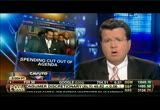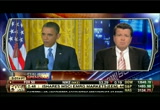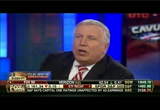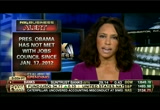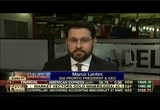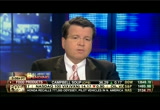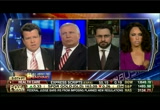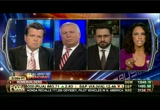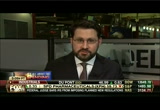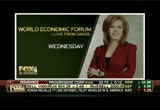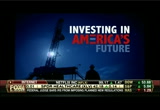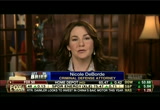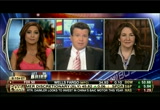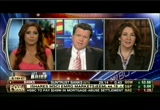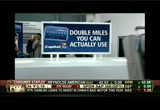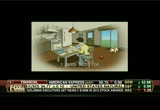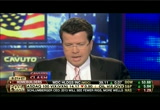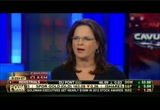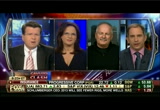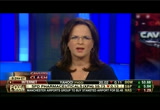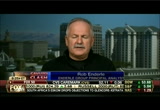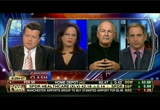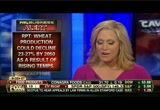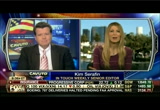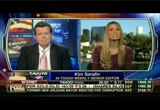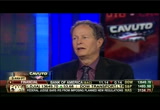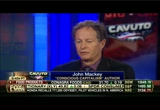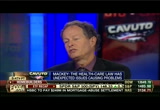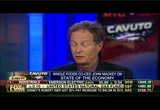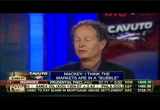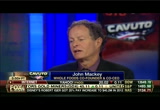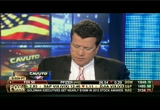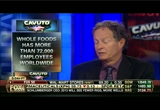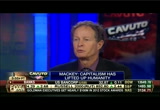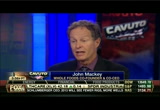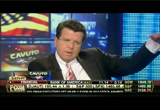tv Cavuto FOX Business January 18, 2013 8:00pm-9:00pm EST
8:01 pm
neil: ahead of the big inauguration what happened to all the big plans for cutting spending? well come, everybody, i'm neil cavuto. i guess the cliff deal was the first clue. 0 times more tax hikes than spending cuts. could explain the president comment to john boehner that we don't have a spending problem. black caucus said we don't have entitlement problem. leave entitlements alone. nancy pelosi says we still have a revenue problem. don't leave the tax hikes alone. what is amazing these guys don't address a problem.
8:02 pm
this weekend we get ready to essentially coronate a president, there is no evidence anywhere among anyone in washington they even see a problem. nowhere in any of the inaugural events is so much as passing bought of spending period. more like a four-day spending palooza, celebrates wonder of government and those that benefit from the government the woman who has a job thanks to the auto rescue. the dad's whose family is protecting thanks to the health care law. i think you get the point. austerity isn't the point. more government is. this inaugural weekend is all about a blueprint for revving it up. the white house says it is low-keying the inaugural festivities because of economy, somehow cutting yourself down to two presidential balls doesn't exactly strike me as sacrifice, as much as a slap in the taxpayer's face. to joe perry, marco and chris. not exactly partying.
8:03 pm
more like watching and worrying. what do you make of what is going on, joe? >> really what has happened is the administration has brought back the specter of uncertainty. we're in the trenches. we're lending money. banks like gold coast really look to help small businesses out, help them realize their dreams. help them have their businesses grow and what the administration has done with the tax hikes that will affect these small businesses, they have essentially --. neil: have you seen that? >> put a damper, yes. i must speak to at least close to the 100 small businessmen each and every day week -- every week. we're out in the trenches. we're seeing it. talking about it, seeing it. touching it. we're not like the generals in washington --. neil: you're on the field? >> we're on the field like macarthur, like patton. hearing, hearing their dreams, aspirations. neil: you know what worries
8:04 pm
me? as i get ready to go down to the inauguration. these are quadrennial big events, republican or democrat. what worries me you think much of the message that got a lot of those folks there is lost. that, the president won election. you could even go so far he won the right to raise taxes on the rich. he didn't get a pass, nor did washington get a pass on addressing underlying spending. it almost seemed as if they're reading into the election that, and it worries me. should i be worried? >> you should be worried. more importantly the american people should be worried. when i watch the president's second term unfold, i feel like i'm watching an episode of laugh-in or "saturday night live." because, neil as you point out, every other day we hear from the credit rating agencies, that debt and spending is threatening the future of america and our credit rating and our ability to continue to lend money to the world, right? and we hear from corporate
8:05 pm
america. joe has just made the case for small business owners. and corporate america is sitting atop of almost $2 trillion in cash, because everybody is afraid. they don't know where this train wreck of a second administration is going. and back to the president. he sat there in fiscal cliff negotiations with speaker boehner and said, john, i'm really tired of you telling me with have a spending problem. quit it. okay, mr. president. you know what i expect him to say, neil at his second inaugural as he put his hand on martin luther king, jr.'s bible and lincoln, i expect him to look american people in the face. ask not what you can do for your country, ask what your country and government can do for you. this is awful. we $16.4 trillion debt and mounting. the president's dared republicans to call him on spending problem. folks if you don't think you will have jobs now, you will not have them in another four years. that is the problem. neil: think about it, whether you're on the right
8:06 pm
or left, we have a very brief honeymoon period, window, in any new administration to attack something that might be controversial and certainly, let's say reining in entitlements. maybe slowing the growth of the military, anathema to republicans. it fits that description. but if you don't do it in that immediate period, you never do. and so it is put off for another few years. that is why i'm reading into these preparations for the inauguration and wondering, where is the talk of this? it might pop up in the president's speech. it might pop up in remarks i get out of officials along a parade route. but i'm worried. should i be? >> well, neil, let's look at what we've gotten so far. you know, with this election we'ven obamacare, which we know will bring higher costs to small businesses like myself but we're still not sure exactly what that figure is going to be. we've gotten tax increases. albeit went from the 250,000
8:07 pm
limit to 400,000. but at the end of the day it is still a tax increases on small businesses and entrepreneurs like myself who, remind you, many years may have gone with little or no pay. have risked absolutely everything, at times, we even mortgaged our house for our business. and then when we finally do make it and reach a certain income level the government steps in and takes more of our money. somehow that to me is not a pro-growth policy and doesn't encourage growth. neil: are you seeing growth, to his point, are you see some pickup in loan activity because the argument you hear in the white house and other democrats is that that might be the quiet wind behind our back? that might be the pickup that we're seeing in housing and manufacturing data and in some of these job figures. it is picking up. that might ease angst like yours? >> no. we're, we're, actually, what we're seeing is, in the, in
8:08 pm
the past six months there was that glimmer of hope, the glimmer where the small businessmen and the banks were together, and they said well, gee, maybe i will look forward and maybe things will get better. neil: what is worrying them now? what do they see now? >> they see all the issues in washington going on. >> but they have got some sense of assurance that they now know how much taxes went up. is it they fear tax going up more? what do they fear? >> they're uncertain. they fear that they can't trust the administration. neil: i see. crystal, that he is your point, right? there is sense we're not over the worst of it? >> no. neil: chris, looking at markets, looking at all the money going to the corner of wall and broad, expressing of late some confidence that is not being reflected here. the white house folks is saying that is the economy, stupid. it is percolating again. you say no? >> no. i think joe alluded to it. he touched upon it just now.
8:09 pm
many economists are talking about the fact that the worry is coming from corporations, both big and small businesses, not hiring, neil. that is because they can't trust this president to be an honest negotiator. so, we, you know the speaker of the house, and the minority leader, mitch mcconnell, gave the president what i call tax blood. he said, okay, we're going to give in. we'll let you raise taxes on the rich. which only will reyour trillion dollar deficit spending each year 5%, folks. so they gave them that. what does he come back with? we want more. i want more tax hikes which aren't going to do anything to calm the debt and the spending. he is not willing, and so i think back to what joe said. i think marco said this too. small business owners and large corporations can't trust the president. that's why they're sitting on top of all this cash and not hiring. that doesn't bode well. neil: marco, quickly you see nothing to dissuade you or some of your colleagues from getting off that? >> businesses are still
8:10 pm
growing, neil but they're not growing as much as they otherwise would. and that uncertainty has a very real trickle down effect. i'll use us as an example. we're building a new gio pronto restaurant right now. i would have loved to borrow the total investment from people like joe and gold coast banking. no way i'm going to do that based on uncertainty. i go borrow less than i would otherwise need. i do things like buy refurbished equipment than new. that doesn't help manufacturing sector. i manage the project in house as opposed to hiring a general contractor. which does nothing to employ people in construction. so there are very real trickle down effects of that uncertainty and it's not just looking at our business is growing or not. it is saying that trickle down effect of that uncertainty is having having negative effect. even though some people like me are still growing we're not maybe growing at the pace we otherwise would have. we're being much more conservative in how we grow. neil: we'll see if that is
8:11 pm
reflected this weekend. certainly next week. monday, by the way i will be there, starting 11:00 a.m. on fox business. back at 4:00 p.m. on you're world as the inauguration festivities continue -- "your world". wrapping it up on fox business. the food fight that could make an allergy a disability. could make you nuts if you're allergic to nuts. the head of whole foods giving the white house a whole lot of lip. he is here and has a big beef with washington. ♪ ♪ ♪
8:12 pm
[ male announcer ] you don't have to be a golf pro to walk like one. ♪ when you walk 10,000 steps a day, it's t same as walking professional golf course. humana. health and well-being partner of the pga tour. at legalzoom, we've created a better place to handle your legal needs. maybe you have questions about incorporating a business you'd like to start. or questions about protecting your family with a will or living trust. and you'd like to find the right attorney
8:13 pm
to help guide you along, answer any questions and offer advice. with an "a" rating from the better business bureau legalzoom helps you get personalized and affordable legal protection. in most states, a legal plan attorney is available with every personalized document to answer any questions. get started at legalzoom.com today. and now you're protected. i have no idea what the heck gluten is. a justice department ruling forced a small college in massachusetts to include gluten-free foods on its menu for people alert to that substance complained to the government and won. now food allergies could be
8:14 pm
considered a disability under federal law. i wonder if you're allergic to eating healthy? i could run with that. restaurant, schools, anyone who serves food now left worrying about lawyers literally going nuts, sometimes suing over nuts. let's bring in the lawyers who are not nuts i might point out. nicole, can restaurants then be found liable if they are not prepared to deal with the disability that is an allergy? >> i don't think that's what this particular settlement says. what this decision says. in this particular case what happened is that the university forced the students to purchase the meal plan and then, at least one of the students, the student who made the complaint couldn't eat from that meal plan because the foods he couldn't could eat weren't offered. that is the nature of the disagreement started the justice department investigation into the case and ultimately caused them to reach settlement. neil: to make sure it did
8:15 pm
have such foods on its, on its offerings, right? >> exactly. and i think what happened in this case was that the university sort of walked themselves right down this path saying to the students you must have this meal plan but then, they didn't provide any food that the students could actually eat. neil: yeah. i didn't know, and all of a sudden now, this sort of thing, a food allergy, is a disability. that opens up a host of issues, doesn't it? >> absolutely. and i hate to sound cliche but talk about a nanny state? and you know, not to be unsympathetic this goes way too far. and not only are the floodgates of litigation now going to be wide open, you about this opens up a pandora's box, neil. what is next? is long hair will be considered a disability? short hair? i mean we can not allow this to take place. neil: what is your big worry? what is your big worry? what will happen? >> let me put it to you like
8:16 pm
this, food allergies are not, excuse me, they are individualized unlike other disabilities rightly recognized by the ada, deafness, blindness. people paralyzed and wheelchair-bound. with food allergies there are thousands and thousands and thousands of them. how are restaurants, schools, places of public accommodation going to be required to accommodate each and every individual's allergies? it is not plausible. it is going to be way too burdensome and costly. ultimately it is going to drive businesses to shutdowns and schools to stop providing food to their students. neil: nicole, haven't we already seen something like this already going on at schools? in my kids hases one has a little -- classes one of them has, is a letteringic to everything including my son. but they have to accommodate this child a lovely child. but to the point where the normal class parties, they're gone. everyone is eating carrots. and my son's miserable
8:17 pm
because like his old man he likes to eat. so i'm just thinking, can we take this, with the best of intentions too far and do people fear, administrators, business operators, in the future, better to play it safe than risk a lawsuit later? >> well, you know, i think there's a lot of sort of alarmist response to this this decision was fairly isolated but in response to your questions concerning, for example the class parties, some of these allergies can be extremely severe and including causing the result of death. and so the people who have students like this in their classroom or have to say, you're going to eat off of our meal plan, have to be able to provide a safe environment for the student that they're making those demand from. so, i --. neil: say, you have 25 kids in a class and one has these issues. >> right. neil: for the other 24, everything is turned upside down to accommodate. >> exactly. 25 separate kitchens? it is not plausible. it is not workable.
8:18 pm
like i said, with other disability as that are recognized by the ada there's a one-time fix. businesses can recognize that someone in a wheelchair would need a ramp. they can build the ramp one time. build an elevator and it is a done deal. how can you do this for 25, 30,000 allergis? these schools have large student populations. it is no the plausible. it is taking it way too far. neil: we'll watch very closely, ladies. thank you in the meantime. forget about apple getting crunched, a real problem, apple is no longer cool? the boys use capital one venture miles for their annual football trip. that's double miles you can actually use. tragically, their ddy got sacked by blackouts. but it's our tradition! that's roughing the card holder. but with the capital one venture card you get double miles you can actually use. [ cheering ] any flight, ytime.
8:21 pm
8:22 pm
share from levels reached a few months ago when it seem to be the king all tech school. now a flash in the pan whose best days are behind it? is that fair, or overdone? liz macdonald, adam lashinsky. is apple no longer cool? does it come back to that? >> well it kind of is. i think issue when steve jobs died apple became visably vulnerable and samsung went after its image with a passion and hit. so the end result is this apple is not really being followed by any other vendors anymore. it is not standing alone anymore. the end result it is not as cool as it once was and can't maintain the same valuation as a result. neil: lizzie i disclose, apple shareholder. i own apple stock. don't say anything bad about apple. no, i'm kidding. but i am getting this sense when i talk to people and a lot of people on our staff,
8:23 pm
they're geeker than you and i will ever be and they actually know what they're talking about when it comes to this stuff and many of them share this view, well apple is getting kind of outhustled on the tech front on innovation an all that stuff. i don't know whether that means outhustled for the time being or whether that is a complete change? >> i think they're getting outhustled. i think what is happening teens, not just teens but baby boomers you know what? the products are elegant. yes, they're cool. what is cool waiting in line for a souped-up version of same old-same old? i'm always dropping my smartphones and cell phones. i'm waiting for cell phones made out same tear as basketballs. what is great for waiting in line for same old-same old and paying $500 for the same old-same old. when you have apple products hard to sink their products. apple the word on the street makes it difficult.
8:24 pm
they want you to buy their other products too. teens are pretty smart shoppers now. they know the storage space on apple's products shot up rapidly by iphones or putting their addresses in there, if you have over 1,000 addresses, you won't have the same storage space. neil: you have over a thousand addresss? you have a lot of friends? >> people want to talk to me i guess. neil: seven friends. >> seven prends? neil: immediate family. >> and your cousins. >> the ones who like me. it is interesting, she raised a very good point, adam, i want to raise with you, there is nothing new coming out. i love a lot of apple products and all. i see what lizzie said. when a new one comes out, just slightly more souped-up. maybe this was going on with steve jobs and i wasn't paying attention. >> yeah. neil: there is not a lot of there there, or as much there as there used to be. >> look everything liz and rob has said is true but, in my opinion way overblown. i would compare this to the position that the united
8:25 pm
states was in after world war two when we had something like, i don't know, 50 or 70% of the world's gdp. that wasn't going to last. apple's position in smart phones and tablets and computer isn't going to last. there are going to be others. that doesn't mean they're not cool anymore. doesn't mean they're not profitable anymore. by the way, we're going to measure them not on whether or not they come out with the next cool smartphone which they led five, six years ago but whether or not they come out with the next cool thing. so it's been about three years since their last cool thing. that was the ipad. >> what is that cool thing? apple tv, the margins there will be really, really thin to make money off of apple tv. listen i spent a lot of time on forums and apple blogs and talking to apple customer service representatives. there is nothing really cool about that. cool, elegant products are nice. you want something that really works. keypad on iphone is difficult to use. i found the iphone difficult
8:26 pm
to use. i think samsung -- >> i'm not disagreeing with you. i think what you say is all true but if you look at their track record they repeatedly came up with the next big thing whether imac, ipod. neil: rob, to this point they're not doing that as much. they might be in fact a victim of their own success with high expectations, only this could be interpreted as bad news when apple has to cut back on the number of parts orders for iphone 5 because they sold only like a gazillion. >> right. neil: so there is some of that. and lizzie and i know the pressure living up to our incredible reputations. but, i am wondering whether that is all that is going on here? that apple just got ahead of itself and just adjusting? >> well i think you can look at one other thing. that is apple was designed around the unique skills of one person and that was steve jobs. >> right. >> he had inate skill with regard to marketing. he knew how to make a design and make it magical. those are things they have not been able to replace.
8:27 pm
apple is in kind of denial. neil: that is what lizzie is calling it. >> not necessarily giving them enough time, rob. it has been one year. >> but you if look at tim cook, as the logistics guy to run the company. how many high-profile companies are run by a logistics guy? need someone in the product space. >> you may be right. you may be right and you may be absolutely right but it has been a little over one year. so all i'm saying is, if in three years they haven't come out with some mind-blowing product, then we can say, it was so obvious if you put a logistics guy in charge of this company they were never going to replicate what steve jobs did but let's see. neil: you're giving them time. you're optimistic. lizzie you're not. >> right. neil: rob, you're just holding out a little bit, right? >> no. what i'm saying we've actually seen before when steve jobs left the last time, it came apart. so that we have actually see
8:28 pm
enseen this play out in the past. >> one analyst said is right, they're in earnings purgatory. they're so big it is hard to do repeat performance of earns growth. >> they're less big now than a few months ago. >> the market drop they have seen since september some analysts said $200 billion, that is equivalent to the gd of of pakistan. that is how big apple is and it is hard to keep repeating grat performance. >> absolutely. neil: hasta la vista. greenies say unless you go green, pasta will be mia, mama mia. s on your long-term go, not their short-term agenda. [ woman ] if you have the nerve to believe that cookie cutters should be for cookies, not your investment strategy. if you believe in the sheer brilliance of a simple explanation. [ male announcer ] join the nearly 7 million investors who think like you do: face time and think time make a difference. join us.
8:29 pm
[ male announcer ] at edward jones, it's how we make sense of investing. [ male announcer ] at edward jones, that's a good thing, but it doesn't cover everything. only about 80% of your part b medical expenses. the rest is up to you. so consider an aarp medicare supplement insurance plan, insured by unitedhealthcare insurance company. like all standardized medicare supplement plans, they pick up some of what medicare doesn't pay. and save you up to thousands of dollars in out-of-pocket costs. call today to request a free decision guide to help you better understand what medicare is all about. and which aarp medicare supplement plan works best for you. with these types of plans, you'll be able to visit any doctor or hospital that accepts medicare patients... plus, there are no networks, and you'll never need a referral to see a specialist. there's a range of plans to choose from, too. and they all travel with you. anywhere in the country.
8:30 pm
join the millions who have already enrolled in the only medicare supplement insurance plans endorsed by aarp, an organization serving the needs of people 50 and over for generations... and provided by unedhealthcare insurance company, which has over 30 years of experience behind it. call today. remember, medicare supplement insurance helps cover some of what medicare doesn't pay -- expenses that could really add up. these kinds of plans could save you up to thousands in out-of-pocket costs... you'll be able choose any doctor who accepts medicare patients. and you never need referrals. so don't wait. with all the good years ahead, look for the experience and commitment to go the distance with you. call now to request your free decision guide. this easy-to-understand guide will answer some of your questions, and help you find the aarp medicare supplement plan
8:31 pm
that's right for you. neil: all right. man, oh, man, icotti. environmentalists are getting saucy and this will make you boil. check out the "newsweek" article. the end of pasta. says rising temperatures and droughts caused by global warming could wipe out the grains that make noodles. these are the same green noodle heads today's snow in mississippi and alabama, well, climate change. now, first things first, by the way. this is "newsweek" that couldn't see its own demise. that is just -- i digress. melissa francis says this is one big carbo load. melissa. >> i was nervous. i long been a foe of the environment and nature mainly because i don't love camping or bugs. we haven't been on the same side of the global warming debate. neil: "little house on the
8:32 pm
prairie". you seem to be very happy back then. >> yeah. one big lie. neil: get me back to the city. get me back to the city. >> quickly as possible. i live in the concrete jungle here. in any case i got really nervous when i heard olive garden was being threatened. wait a second --. neil: you have never been in a olive garden. >> i love olive garden. i love olive garden. neil: look at me. all right, i will play along. keep going. >> so, you know, i was very worried about this. lo and behold thank goodness "newsweek" was wrong, totally wrong. their premise is basically that global warming is crowding out pasta, you know, it is ruining our climate. what did they say, temperatures are rising. rainfall is shifting. droughts are intensifying. what will we eat when wheat won't grow? neil: till we're all done. >> right. where do you start. neil: what is so stupid, you want to make people afraid. you can have it any way you
8:33 pm
want. remember it was very warm out. >> right. neil: global warming. when it is warm it is global warming. too much pasta, global warming. too little pasta. i kid but to make the point, this argument can go to extremes in either direction. >> it can. the problem is though they got, the math really tripped them up here because they were unable to find the stats to really back up their theory it is getting so harm we're having hard time growing wheat. neil: -- internet. >> it turns out that wheat yield since the '70s, they're looking at this period when we've been looking at global warming as you said we're calling climate change in the middle of winter when you call it global warming it doesn't sound that bad so you have to call it climate ccange. this began in the '70s. if you look at crop yield over that time, it increased. the data exactly refutes their theory in this article. the yield of wheat crop up 50%. corn in this time has doubled. rice is up 45%. and you can't say that we're farming more land. it is-year-old per acre. we are many becoming more productive on the same land
8:34 pm
over this period of time. so the numbers from the department of agriculture --. neil: so they lied. >> i don't want to call anyone a liar. they sort of were not, in a close relationship with the truth and facts. i think the numbers were really inconvenient. when you go and get the data, i'm a numbers nerd. i like the data to back up your theory. i'm such a pain in the ass like that. but in this case, it didn't work out for them. neil: i'm still thinking of like, friday night. yeah, olive garden downtown. melissa francis, party of four. >> the olive garden down in chelsea, are you kidding me? i stood in line. all-you-can-eat. bread basket, salad can't stop. my kids are running everywhere. it's true!. neil: i don't see it. >> it address 's true. neil: unless there is tassel on the menu you're not there. >> you're talking about yourself. >>. neil: global warming climate change, do not touch her pasta. arnold said he would be back. look at this, he is back.
8:35 pm
8:36 pm
email marketing from constant contact reaches people in a place they're checking every day -- their inbox. and it gives you the tools to create custom emails that drive business. it's just one of the ways constant contact can help you grow your small business. sign up for your free trial today at constantcontact.com/try.
8:37 pm
>> how are you doing, man. >> there is escaped fugitive coming into town. >> you look jacked. are you working out? >> give me the damn thing. neil: cheating scandal, love child, people are shill showing arnold the love. his new movie, the last stand, just out. at the same time people are taking a stand against this guy who might just be on his last leg. to whether arnold is back and lance will never come back. what do you think, ken? >> well i think it is interesting. we'll have to see arnold's movie does. it is just opening now. we'll have to see if it does well. obviously hollywood wouldn't bank on him if they didn't think there would be bank. neil: this movie looks stupid. this one looks stupid. i like him. this is not the movie i
8:38 pm
would come out with, but, whatever. >> yeah. he has three more --. neil: i don't see lance coming back. i see arnold coming back, not with this movie but don't see arnold, don't see lance. >> interesting arnold has three more movies coming out. they're developing triplets which would be a sequel to twins for him. what is interesting people are actually asking arnold his advice for lance. i heard him on extra, he was being interviewed. do you have any advice for lance armstrong? which i don't think a year ago would have thought arnold would be giving advice to anyone. he was saying people are forgiving. they're just not forgiving when you lie. the cover-up gets you into trouble. i think that is what people are saying right now about lance. i mean, it is very different if you have personal issues versus issues that involved cheating. the biggest cover-up in sports history, really. and then all the attacks that lance armstrong made on all of the whistle-blowers. so i think that is a very different story than the personal issues. neil: i agree with you there. i think you hit it right on
8:39 pm
the head there. i also think that there comes with it, and i don't mean to be cynical or snide, there comes with hollywood or former hollywood guys an expectation that they cheat, or that they're not faithful the i'm not saying that is fair or right. i'm saying that is a side of the view. there is sort of roguish kind of liking of a lot of folks have for arnold schwarzenegger. i don't think that same sort of familiarity or warmth exists towards lance armstrong especially after not only his repeated denials but the vehemence of those denials. >> exactly. oprah even asked him that in the interview last night. you vehemently denied this for 13 years. a lot of people are saying it doesn't seem like he is really sorry. it seems like he is sorry he got caught. seems like he is doing this interview as part of dish. neil: wasn't that bill clinton strategy? he was only sorry he got caught. only found he was sorry when they found out a dress and felt back to take back the
8:40 pm
remark that i never had sex with that woman. so he had to pull back. what about here? why would bill clinton get a pass and not this guy? >> i think what lance armstrong, also i think a lot of people think he is doing this because he wants to lick that lifetime ban. neil: bingo. bingo. there is a reason. there's a reason. opportunistic reason. >> i think exactly, people see there's a reason that he is doing this. they don't see he is really poll getic. he wasn't teary-eyed in interview last night. didn't seem like he was doing it because he felt bad. neil: kim, you're not saying that a guy has to cry in order to get you over to their side? >> no. but, you know, a little emotion may have been nicer i think people might have been expecting that. neil: i don't believe in emotion, kim. all right. >> mostly hearing people say, now, they're even wondering if his whole livestrong, his whole charity something he had just as sort of to insure his reputation, not that he really wanted to do it. so when you have that, even
8:41 pm
people putting that charge against him, you know. then again, stranger things have happened. like i said nobody thought anyone would be asking arnold his advice a year ago. you never know. people are talking about the notre dame football player right now which is taking a little bit of heat off lance armstrong because that is the other big story in the news. neil: that is a whole separate soap opera. kim, thank you very, very much. good seeing you again. >> thank you very much. neil: the health food mogul says the president's health care law is unhealthful for everybody. whole foods ceo john mackey is loaded for bear.
8:45 pm
president's health care law after apologizing calling it fascism. he is still not a fan. co-ceo john mackay would like to leave health care to the private sector but have companies that care about people handle it. that was essentially his new book, consensus. conscious capitalism. all about that. this is the guy all about doing the right thing. john, good to have you. >> thanks, good to be here, neil. neil: we were briefly trying to get to the bottom of the break when you started to getting vocal on these issues. i think you always have been. you have a very strong point of view when it came to the role of government and the private sector. what brought it out or got it really big? was it the campaign? >> i don't think so. i mean, i was very concerned about the health care law. i thought it was going to be bad for business. >> why? >> it will drive up costs. neil: you saw that a lot
8:46 pm
sooner than a lot of ceos. what got the antenna up. >> i have a great confidence in free enterprise capitalism. when markets are allowed to work and competition occurs, costs tend to go down. you get more choices. we did not have free enterprise capitalism before. we ratcheted up several notches. more controlled by the government. moved away from free enterprise capitalism. i assume it will get, would. neil: so here we are, with the health care law now rolling along, not stopped or stalled by the supreme court. all the new taxes for it. especially on the upper income kicking in this year. more to come. what do you see happening? >> well, there is some unintended consequences from the law that will cause some problems. one is that, you don't have to insure people if they work under 30 hours. so, as costs go up, it will become more and more expensive for companies to insure people. there are going to be more and more tempted to employ
8:47 pm
fewer full-time workers and more part-time workers. neil: we're seeing that already. >> yes. neil: are you doing that? >> we haven't really done that yet. maybe a little bit. we're kind of waiting to see how the other shoe drops. they really haven't come out with all the mandates they will require businesses to cover. neil: a lot of businesses got exemptions, you know? >> they got exemptions for part of it but --. neil: not the 30-hour thing. >> that's right. what we'll end up sighing is, we know that when states, when it was the states controlled, it, we didn't really have national competition in health insurance. so each state was vulnerable to the lobbyists making sure this got covered and this got covered. corporations that were large corporations were exempt from that through the aries salas. whole foods could self-insure. -- erisa laws. neil: erisa is employment
8:48 pm
insurance act. that is not there. >> corporations will have national standards and they will apply to all companies, corporations won't be any longer to sort of fine tune their plans for their reality and their workers. kind of be one size fits all. we don't yet know what that size will be so it is impossible to calculate costs. we'll find that out next year or two exactly what will be the full extent of the law. neil: are you surprised, just pretty savvy business guy in your own right, how the markets, not necessarily a great barometer of all things business, but, they have been okay? a lot of money flooding into the markets again. a lot of money chased off the sidelines into the markets again? someone must be walking past this graveyard and ignoring it or not worried about it? >> i think it is a bubble. neil: you do? >> sure the fed is rapidly increasing the money supply. interest rates are virtually nothing. neil: what do you see happening? >> a lot of it is flowing into the stock market. and that's, you know --.
8:49 pm
neil: but that bubble implies it bursts? >> a lot of it is being exported around the world. so we're seeing, we don't really have a, markets are not working competitively in a sense now because the fiat money creation is resulting in --. neil: so what happens? as you see things right now, john, what happens? >> it's hard to say. i'm not, what is that cliche? really risky to make predictions about the future and i'm sort of in that category. i'm not a, very difficult to predict that kind of stuff. if you keep increasing the money supply, it, it sets business people can make the bad calculations. they can't really understand it. it is, as a result, you end up with asset bubbles. you have the real estate asset bubble. many stock market bubbles over the years. don't have any kind of frenzy yet. but at some point, particularly with trillion dollar deficits every year,
8:50 pm
we'll have challenges ahead i think. i think that's one of the reasons we wrote our book, "conscious capitalism". we think there is better way to do business. business has the potential to have higher purpose. create more value for all of its stakeholders. think businesses --. neil: you think it adheres to that? we came off a campaign mitt romney, business interests were pilloried for being selfish, self-centered. >> that's right. neil: out for the almighty dollar. >> narrative the business is captured by enemies of business, its critics. greedy, self-exploitive and greedy about the bottom line. neil: how would you address that. >> it's not true. that's why i wrote the book to address it. think about it, doctors are well-compensated in our society. their purpose is not to maximize their profits. they have a higher purpose. to heal people. teachers educate. architects design buildings. neil: the rap against you have a lot more money to do
8:51 pm
what you're doing than those guys and you're not helping. >> we create value for other people. you can't make money in truly competitive markets unless you create more value for people because people are not forced to trade with you. they trade with whole foods because they believe it is in their best interests to do so. it is voluntary. we've been successful and prosperous. we created value for customers, employees, for suppliers. for investors. neil: this mistrust that developed, you say inspired by barack obama or liberals, to not hold the rich in high regard, or to all but assign sinister motives to their success, what do you think of that? >> obviously i don't like it. business is the greatest value creator in the world. it is business and capitalism that lifted humanity up. think about it, neil, 200 years ago, 85%. people alive on the lan planet earth lived on less than one dollar a day. 85%. today it is 16%. if we continue to embrace free enterprise capitalism we will eliminate poverty in
8:52 pm
the 21st century across the whole world. humanity, average lifespan 200 years ago was 30. today across, it is 68. it is 78 in the united states. almost 80 in japan. illiteracy rates were 90%200 years ago. now 15% across the world. humanity i had made great progress. it is due to business and due to capitalism. neil: more on that. image, its reputation, is that fair, that right. john mackey, whole foods genius on how business tries to smarten up. after this.
8:53 pm
progressive claims. this is flo. i need you. i feel so alone. but you're not alone. i knew you'd come. like i could stay away. you know i can't do this without you. you'll never have to. you're always there for me. shh! i'll get you a rental car. i could also use an umbrella. fall in love with progressive's claims service.
8:54 pm
8:55 pm
foisted particularly during the campaign that business is only out for business and the level of distrust, of the rich, of those who are successful, of businessmen and women in general have never been higher. maybe thanks to that campaign. how do you win that back? how do you counter those, particularly in the mainstream media who actually foist that view to change that view? >> you're correct. gallup shows in 2011, that big businesses approval rating in the united states was 19%. i mean 81% disapproved. that is about right where congress is. business --. neil: tv anchors. very upsetting. >> business is hardly distrusted. it has a terrible reputation. i think base the narrative has been hijacked by the enemies and critics of business. neil: so think -- >> we have to take control of it. neil: few bad eggs. wall street gets blame because of a few fat cats into making a killing without any regard to people.
8:56 pm
ruined it for everyone else. >> business is judged by its worst actors. enrons, bernie madoffs. that is generalized to all business people are that way. we don't treat other segments of society that way. we don't judge our journalists by the bad eggs. we don't judge our doctors that way. neil: actually i do. society doesn't. if there is such a thing as business ethics czar, what would first thing you would try to correct or get across to people? >> we have to get out of this trap that business all about making money. of course business needs to make money. that is not its purpose. not its highest purpose. my body needs to produce red blood cells for me to live. if i don't produce red blood cells i die. similarly business creates value for customers. business has to tell the story. we're the value creators in this world, neil. we're the heroes. we're helping humanity to advance, make progress, new
8:57 pm
inventions. our lives are transformed by technologies that businesses are creating. neil: we came off a campaign was pilloried saying 47% of the people get something from the government and there were many in that 47%, might have gotten their nose out of joint but no one stepped back to say how did it get to be 47% anyway, not paying any income taxes? >> gradually over time. and, we do have --. neil: you think there is a shift here? more and more dependent on the government or like the government. clearly one of the things you could read from this election a good many have that view, hard to win the pendulum back, isn't it? >> well you have to do a better job telling our story because business is creating great value in this world but it is doing a very bad job explaining that and defending itself. that is what our book is all about. it will help business people to be more successful with their businesses. to be proud of what they're accomplishing, the good they're doing in society. this is our great story. this is our great message. we have to tell it and we're
8:58 pm
helping them to do that. neil: does it make it hard when some of your colleagues earn a ton of money? disproportionate even to their company's success? as an executive making $100 million, some people are saying all right, we give him his due and his respect but that's beyond the pale? >> i think it does hurt it. again, business is judged by its, maybe perhaps most greediest members. most business people do not make anything close to that. the business people make a good living but not making those really, really obscenely high salaries but i think that hurts the reputation of business. seems like business, some businesses are greed di. but makes it look like everybody is that way. neil: so when the administration now with the new tax law targets wealthier taxpayers to the degree not only top rate, but if you add on medicare surtax and everything else we're at 45% federal rate effectively and throw in state and local taxes it is a lot higher that than. when you hear the administration say it us time for them to do their
8:59 pm
fair share, talking about guys like you, how do you feel about that. >> obviously i think you're being singled out for, punishment. we know that raising those tax rates is not going to produce that much additional revenue for the government. possibly produce less as people will again to shelter more of their income. neil: they want to produce more revenue. they don't want to cut more but nancy pelosi wants more revenue. what do you say? >> i don't think it is necessary. i read a study recently by daniel mitchell that showed we can completely eliminate in 10 years the annual deficit if we only let government spending increase 2% a year. so we don't have to cut it at all. we can let government spending grow at a 2% clip every year. neil: there is lot of -- things never get addressed. we call a cut, a cut, when it is a slowing growth of something. >> that's right. neil: you get the vernacular and jargon down. so, isn't it, is it possible that the debate just gotten so stupi
70 Views
IN COLLECTIONS
FOX Business Television Archive
Television Archive  Television Archive News Search Service
Television Archive News Search Service 
Uploaded by TV Archive on

 Live Music Archive
Live Music Archive Librivox Free Audio
Librivox Free Audio Metropolitan Museum
Metropolitan Museum Cleveland Museum of Art
Cleveland Museum of Art Internet Arcade
Internet Arcade Console Living Room
Console Living Room Books to Borrow
Books to Borrow Open Library
Open Library TV News
TV News Understanding 9/11
Understanding 9/11

